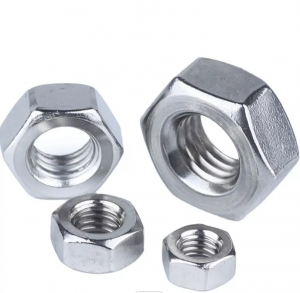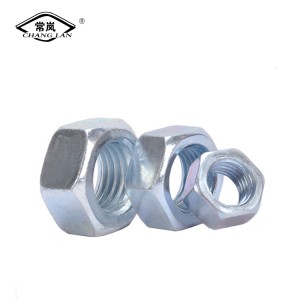Product Description
1. Fastening nut, self - tightening nut is a common type of fastening nut. Including mechanical anti - loose, riveting and punching anti - loose, friction anti - loose, structural anti - loose. Nowadays, self-locking fasteners are widely used to prevent loose thread: 2. Use various self-locking bolts or ring-grooved rivets to realize self-locking; 3. All kinds of spring washers are installed in the thread connecting pair to realize thread self-locking;
2. Due to the change in the Angle of the profile, the normal force exerted on the contact between the threads is at an Angle of 60 degrees from the bolt axis instead of 30 degrees from the normal thread. The thread normal pressure is much greater than the fastening pressure, therefore, the resulting anti-loose friction force must be greatly increased. When the top of the male thread is occlusion with the female thread, the tip of the top of the tooth is easy to deform, so that the load is evenly distributed on the full length of the contact helix, so as to avoid the phenomenon that more than 80% of the total load concentrates on the thread surface of the first and second teeth when the common standard thread is occlusion. Therefore, the threaded coupling pair not only overcomes the shortcoming that the common standard coupling pair is easy to loosen itself under the vibration condition, but also prolongs the service life.
Specification
| Product name | locknut |
| Product specification | M6-M50 |
| Surface treatment | Black、zinc |
| Material | Carbon steel, stainless steel |
| Standard | DIN、GB |
| Grade | 4.8/8.8 |
| About the material | Our company can customize other different materials different specifications can be customized |
First, superior seismic performance: Thread when tighten bolts of tooth top thread which affects tightly into the nut 30 ° cant wedge stuck tightly, and applied to wedge on the slope of the normal force and the axis of the bolts into 60 ° Angle, rather than 30 ° Angle, and therefore, tighten locknut is caused by the normal force is greater than the ordinary standard nut, has a great locking ability to resist vibration.
Second, wear resistance and shear resistance: nut thread tooth bottom 30° inclined plane can make the nut locking force evenly distributed on all the threads, because of the uniform distribution of the compression force on the thread surface of the teeth, so the anti-loose nut can better solve the problem of thread wear and shear deformation.
Third, good performance of repeated use: a large number of use shows that the locking force of the anti-loosening nut does not decrease after repeated tightening and disassembly, and the original locking effect can be maintained.










